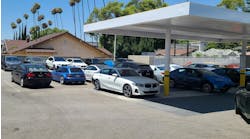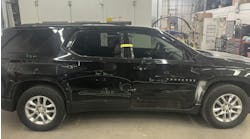There’s a common belief regarding vehicle airbags that they will never need to be replaced if they don’t deploy. However, that’s not necessarily true. It is also untrue that you must automatically replace an airbag after an accident. Often, having the sensors reset and recalibrated is adequate. However, when the airbag does deploy, there’s more to do than just replace the airbag.
Importance of pre-scans
Before beginning any part of the repair process involving airbags, the repair technician should complete a full diagnostic pre-scan. By using the “asTech™” device, the repair technician can determine which Diagnostic Trouble Codes (DTC) have triggered in any part of the airbag system, including the crash sensors or airbag module.
Crash sensors are sealed units so it isn’t possible to determine their true condition just by their appearance. Any crash sensor which may have sustained any type of damage, as a result of an accident, should be replaced.
Airbag replacement
Having the airbags deployed during an accident will obviously mean the airbags need to be replaced. This will, also indicate that airbag control module will need to be replaced and/or reprogrammed. If any of the impact sensors were damaged during the accident, it will generally mean that, they too must be replaced in order for the airbag module to reset and work properly after repairs. Never take a chance that the sensor will work again. Just replace it.
Get Free OEM Training |
|

|
Now is your chance to register for an expo pass to NACE Automechanika Chicago, where you'll have a chance to walk the show floor and take part in free OEM trainings. |
Once the airbag module is repaired or replaced and reinstalled in the vehicle, the vehicle’s computer system will sense that there is no longer an issue, and the warning light will go off. Having the technician replace damaged or deployed airbags, airbag sensors and modules ensures that the vehicle is repaired correctly and safely.
Recalibration
Once all of the airbag systems have been replaced and all damaged parts on the vehicle have been identified and replaced or repaired, the technician will need to recalibrate. All of the DTC’s and faults must be cleared and it must be verified that the system has been repaired before a recalibration can be done. Once recalibrated, the technician should complete a completion/post-scan using the “asTech™” device. This will determine that all repairs to the airbag system have been successfully completed.
For more information on the advantages of using the “asTech™” device, contact our master technicians today.





